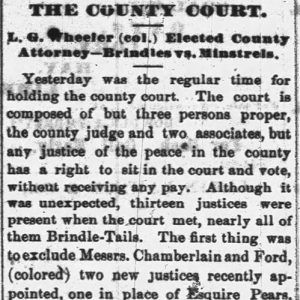calsfoundation@cals.org
Lloyd Garrison Wheeler (1848–1909)
Lloyd Garrison Wheeler was a prominent and trailblazing African-American lawyer, political figure, and businessman in Illinois and Arkansas.
Lloyd G. Wheeler was born in Mansfield, Ohio, on May 29, 1848. His father was active in the Underground Railroad, but when Ohio passed a law making the harboring of slaves illegal, the family relocated to Chatham, Canada, where Wheeler received his early education. When his mother died, he returned to the United States, settling in Chicago, Illinois. There, he worked at a variety of jobs, including on the railroad and as a shoe black. Throughout this period, his greatest ambition was a career in law. He became the first black mail carrier in Chicago while studying law in the office of George Bellows as well as at Union Law College, forerunner to the Northwestern University School of Law. Upon completion of his legal training in 1869, Wheeler was admitted to the bar. It is believed that he was the first African American admitted to practice law in Illinois.
He soon moved to Arkansas, where he became involved in the state’s Republican politics, serving as a delegate to the party’s 1870 state convention. In 1871, he was admitted to the Arkansas bar. His initial venture into private practice was in a partnership with A. D. Jones, but that arrangement did not last, as Wheeler assumed the post of county attorney for Pulaski County. Leaving that position in 1873, Wheeler entered into a partnership with Mifflin Gibbs, an arrangement that united two of the area’s most prominent black attorneys. However, the partnership was short lived, as Gibbs was appointed county attorney for Pulaski County.
Wheeler served on the Pulaski County Board of Commissioners. He was active in Republican politics, serving as a Republican presidential elector for Ulysses S. Grant in 1872. Like many at the time, he found himself drawn into the Brooks-Baxter War that split the state’s Republican Party in 1874, requiring the intervention of the Grant administration to bring political peace to the state organization.
Wheeler was also involved in a historic legal case when, in 1873, he and Gibbs represented four black men who were refused service at a Main Street saloon in Little Rock (Pulaski County). They asserted that, under the 1873 Arkansas Civil Rights Act, the rights of the four men had been violated. He and Gibbs handled the suit and, on appeal, won a judgment against the saloon; it is the only known victory achieved under the Arkansas act. In fact, with the end of Reconstruction, black Republicans became scarce in Arkansas, and, in 1879, after some encounters with the Ku Klux Klan, Wheeler abandoned his solo practice and returned to Chicago.
Putting aside his legal career, Wheeler assumed responsibility for the business affairs of John Jones, a wealthy relative of his wife, Ranie Petit (or Pettit) Wheeler, a Chicago native with whom he had seven children.
In Chicago, Wheeler became an influential figure. He was a major in the Sixteenth Battalion of the state militia, and his successful efforts with the John Jones Clothes Cleaning and Repairing Establishment, as well as other commercial and real estate interests, allowed him to move among the city’s black social elite. He was a sponsor of the Evolution Club, a prominent literary society in Chicago, as well as a teacher of philosophy associated with a number of local churches. He was, at one time, the superintendent of the Sunday school at Chicago’s Olivet Baptist Church. Wheeler was also one of the founders of the Provident Hospital and Nurse Training School, which opened in 1891, and served as president of the board of trustees.
Beginning in 1900, Wheeler began to experience serious business failures, and, in 1903, he accepted his friend Booker T. Washington’s offer of a position at the Tuskegee Institute in Alabama. Wheeler initially was put in charge of business affairs, and, at the time of his death, he was also the superintendent of building and grounds. In his final years at Tuskegee, Wheeler’s health declined. He died on August 28, 1909.
For additional information:
Kilpatrick, Judith. “(EXTRA)Ordinary Men: African American Lawyers and Civil Rights in Arkansas before 1950.” Arkansas Law Review 53, no. 2 (2000): 299–399.
“Mr. Lloyd Garrison Wheeler.” Tuskegee Student, September 11, 1909. Online at http://andrewspress.com/Research/LGWSrObit1909.pdf (accessed September 14, 2021).
Smith, J. Clay, Jr. Emancipation: The Making of the of the Black Lawyer, 1844–1944. Philadelphia: University of Pennsylvania Press, 1999.
“Unedited Notes for Presentation by Lloyd G. Wheeler at the First Wheeler Family Reunion.” Afro-Netizen. http://afronetizen.blogs.com/wheeler/files/Wheelerhistory-CousinLloyd95.pdf (accessed September 14, 2021).
William H. Pruden III
Ravenscroft School
 Post-Reconstruction through the Gilded Age, 1875 through 1900
Post-Reconstruction through the Gilded Age, 1875 through 1900 L. G. Wheeler Election Story
L. G. Wheeler Election Story 



Comments
No comments on this entry yet.